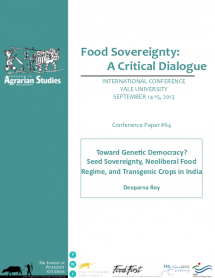Toward Genetic Democracy? Seed Sovereignty, Neoliberal Food Regime, and Transgenic Crops in India
Biotechnology has become the central form of technology in global agriculture since the neoliberal reformulation of global capitalism in the 1980s. Powerful transnational corporations have emerged as the major promoters of transgenic technology (a form of advanced biotechnology) in the global South. The Indian democratic developmental state (which has invested in biotechnology research since the mid-1980s) has its own interests regarding transgenic technology.

Authors
Biotechnology has become the central form of technology in global agriculture since the neoliberal reformulation of global capitalism in the 1980s. Powerful transnational corporations have emerged as the major promoters of transgenic technology (a form of advanced biotechnology) in the global South. The Indian democratic developmental state (which has invested in biotechnology research since the mid-1980s) has its own interests regarding transgenic technology. Has the Indian state succeeded or failed in creating a genetic democracy even as it interacts with biotech transnational corporations and the civil society?
A ‘genetic democracy’ is defined as an ideal-type of society and polity where all citizens participate democratically in the shaping of the nation’s biotech agenda and policies; where the state has complete regulatory control over transgenic crops, and where the public sector plays a decisive role in researching and commercializing transgenic crops.
I argue that the Indian democratic developmental state (in existence since January 1950) has failed in the creation of a genetic democracy partly because of three major cases of state failure with reference to the development and regulation of transgenic crops. I discuss these cases of state failure:
first, the introduction of Bt cotton through unauthorized seeds resulted in a regulatory nightmare for the Indian state which it is still unable to end;
second, the failure of the Indian public sector to successfully commercialize Bt cotton undermined the developmental efforts of the Indian state to deliver low-cost, savable seeds to agriculturists;
and third, the bitter and unresolved debates in Indian civil society over attempts to introduce Bt brinjal (through a public-private partnership) have led to a situation where the apex governmental institution that clears transgenic crops recommended the commercialization of Bt brinjal in 2009, but the Indian state later backed out and imposed an indefinite moratorium on Bt brinjal’s commercialization in February 2010. Cumulatively, these three major cases of state failure (together with the resistance of anti-GM activists) have not allowed a genetic democracy to flourish in India.
If the national goal is the construction of a genetic democracy, then the Indian state and the food/seed sovereignty movement have to co-operate with each other in this creative task. I offer some suggestions as to how the Indian state and the food/seed sovereignty movement can develop trust in biotechnology among Indian citizens and co-create a genetic democracy.
Devparna Roy, Visiting Fellow, Polson Institute for Global Development, Department of Development Sociology, Cornell University Ms. Roy holds a Master’s degree in biotechnology from the Maharaja Sayajirao University of Baroda, Gujarat, India. For her Ph.D. dissertation at Cornell University, she analyzed the early experiences of Gujarat agriculturists with Bt cotton (2002 to 2004). She conducts research on the sociology of agri-food systems in India and the United States of America, with an emphasis on comparing different agricultural technologies (e.g. industrial farming using transgenic seeds versus organic farming), the political economy of land seizures in India, and social movements related to various natural resources (from seeds to land).
Food Sovereignty: a critical dialogue, 14 - 15 September, New Haven.